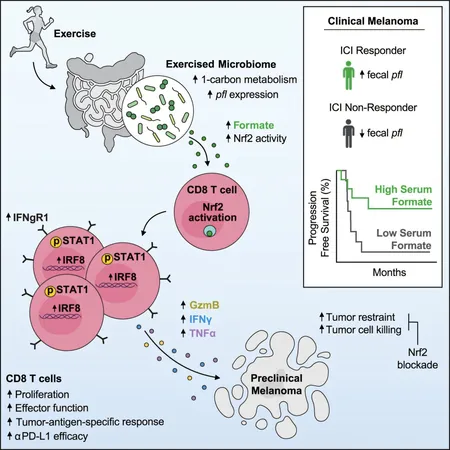
Unlocking the Secrets: How Gut Microbes and Exercise Supercharge Cancer Immunotherapy
2025-07-09
Author: Daniel
Revolutionary Study Links Exercise, Gut Microbes, and Cancer Outcomes
A groundbreaking study from the University of Pittsburgh has unveiled a powerful connection between exercise, gut microbiomes, and enhanced responses to cancer immunotherapy in mice. Published in the journal *Cell*, this innovative research reveals that the benefits of exercise in combating cancer may largely stem from alterations in gut bacteria.
The Impact of Formate: A Hidden Power
At the heart of these benefits is a compound known as formate, produced by the gut bacteria of mice engaged in regular exercise. This compound has also been observed in patients with melanoma, indicating a potential link to improved cancer outcomes. Marlies Meisel, Ph.D., the senior author of the study, emphasized, **"This study connects those dots by showing how exercise-induced changes in the gut microbiome boost the immune system and enhance immunotherapy efficiency via formate."
Exercise vs. Sedentary: A Tale of Two Mice
The research team, led by graduate student Catherine Phelps, compared mice that exercised for four weeks with those that remained sedentary. The outcomes were remarkable—exercised mice showed smaller tumors and significantly better survival rates when challenged with aggressive melanoma. However, when germ-free mice or those treated with antibiotics were used, the beneficial effects of exercise vanished.
The Role of Microbial Metabolites in Immune Response
Digging deeper, researchers discovered that it was not the bacteria themselves, but the metabolites they produced, particularly formate, that drove the cancer-fighting effects of exercise. Using advanced machine learning tools, the team identified formate as the key player in enhancing the potency of CD8 T cells—the body’s primary agents of cancer destruction.
Formate's Promising Future in Cancer Therapy
Excitingly, daily administration of formate in various mouse models showed a drastic reduction in tumor growth and improved survival rates. This compound also amplified the effects of immune checkpoint inhibitor therapies.
Clinical Insights: Formate and Human Patients
To further explore the therapeutic potential of formate, Meisel’s team turned their attention to advanced melanoma patients undergoing immune checkpoint inhibitor therapy. Those with elevated formate levels in their blood showcased better progression-free survival rates. In experiments involving fecal microbial transplants (FMT) from donors with high versus low formate levels, mice receiving the high formate transplants exhibited boosted T cell activity and superior tumor control.
The Quest for 'Super Donors' and Future Research
While FMT is already being investigated as a means to enhance immunotherapy effectiveness, the reasons behind the varying success rates from different stool donors remain elusive. Meisel stated, **"We want to describe metabolic biomarkers to identify FMT super donors because that’s a black box." Our research suggests that it’s not just about which microbes are present, but what they’re doing and which metabolites they produce."
A New Era in Cancer Treatment Awaits
With this pioneering study, researchers may be unlocking a new frontier in cancer treatment strategies by targeting the gut microbiome. The findings suggest that combining exercise and understanding the role of metabolites like formate could herald significant advancements in personalized immunotherapy protocols, ultimately boosting survival rates for countless cancer patients.


 Brasil (PT)
Brasil (PT)
 Canada (EN)
Canada (EN)
 Chile (ES)
Chile (ES)
 Česko (CS)
Česko (CS)
 대한민국 (KO)
대한민국 (KO)
 España (ES)
España (ES)
 France (FR)
France (FR)
 Hong Kong (EN)
Hong Kong (EN)
 Italia (IT)
Italia (IT)
 日本 (JA)
日本 (JA)
 Magyarország (HU)
Magyarország (HU)
 Norge (NO)
Norge (NO)
 Polska (PL)
Polska (PL)
 Schweiz (DE)
Schweiz (DE)
 Singapore (EN)
Singapore (EN)
 Sverige (SV)
Sverige (SV)
 Suomi (FI)
Suomi (FI)
 Türkiye (TR)
Türkiye (TR)
 الإمارات العربية المتحدة (AR)
الإمارات العربية المتحدة (AR)